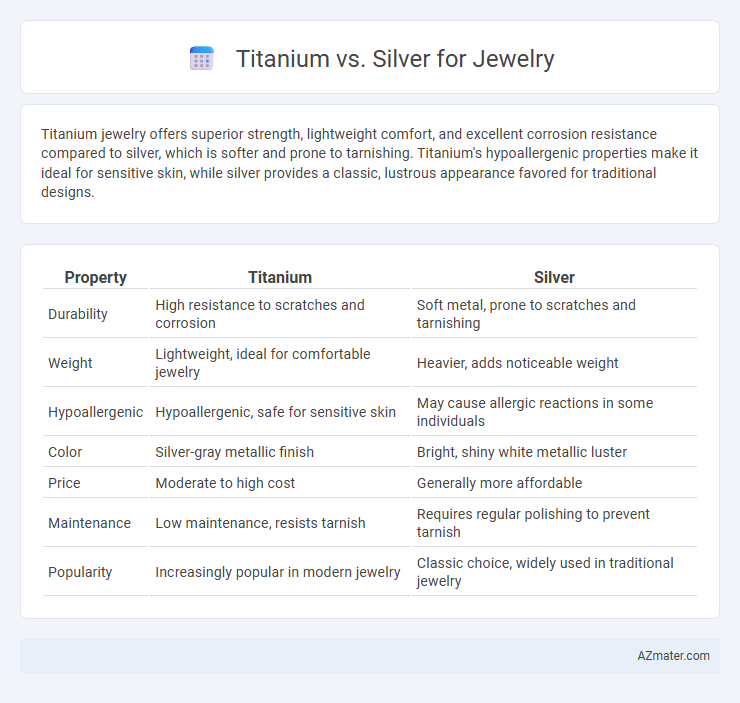Titanium jewelry offers superior strength, lightweight comfort, and excellent corrosion resistance compared to silver, which is softer and prone to tarnishing. Titanium's hypoallergenic properties make it ideal for sensitive skin, while silver provides a classic, lustrous appearance favored for traditional designs.
Table of Comparison
| Property | Titanium | Silver |
|---|---|---|
| Durability | High resistance to scratches and corrosion | Soft metal, prone to scratches and tarnishing |
| Weight | Lightweight, ideal for comfortable jewelry | Heavier, adds noticeable weight |
| Hypoallergenic | Hypoallergenic, safe for sensitive skin | May cause allergic reactions in some individuals |
| Color | Silver-gray metallic finish | Bright, shiny white metallic luster |
| Price | Moderate to high cost | Generally more affordable |
| Maintenance | Low maintenance, resists tarnish | Requires regular polishing to prevent tarnish |
| Popularity | Increasingly popular in modern jewelry | Classic choice, widely used in traditional jewelry |
Introduction to Titanium and Silver in Jewelry
Titanium jewelry offers exceptional durability and hypoallergenic properties, making it an ideal choice for sensitive skin and everyday wear. Silver, prized for its classic luster and affordability, has been a staple in jewelry craftsmanship for centuries but requires regular maintenance to prevent tarnishing. Both metals provide unique advantages, with titanium excelling in strength and lightweight comfort, while silver shines with timeless elegance and versatility.
Physical Properties Comparison
Titanium has a density of about 4.5 g/cm3, making it significantly lighter than silver, which has a density of 10.5 g/cm3, offering greater comfort for everyday wear. Titanium's tensile strength ranges from 434 to 1,400 MPa, far exceeding silver's tensile strength of approximately 170 MPa, contributing to its superior durability and scratch resistance. Silver exhibits higher thermal and electrical conductivity, but it tarnishes quickly unlike titanium, which maintains its appearance due to its corrosion resistance and hypoallergenic properties.
Durability and Strength
Titanium jewelry offers exceptional durability and strength, making it highly resistant to scratches, bending, and corrosion compared to silver. Silver, while valued for its lustrous appearance, is a softer metal prone to tarnishing and scratching over time. Titanium's lightweight yet robust properties ensure long-lasting wear, ideal for everyday use and active lifestyles.
Hypoallergenic Qualities
Titanium is highly favored for jewelry due to its superior hypoallergenic properties, as it rarely causes skin irritation or allergic reactions compared to silver. Silver, especially when alloyed with nickel, can trigger allergies and skin sensitivities in many individuals. Choosing titanium jewelry is ideal for those with sensitive skin or metal allergies seeking durable, safe options.
Appearance and Aesthetic Appeal
Titanium jewelry offers a sleek, modern appearance with a naturally grayish-silver tone that resists tarnishing, maintaining its shine over time. Silver jewelry boasts a bright white luster that is highly reflective but can tarnish and require regular polishing to preserve its aesthetic appeal. The choice between titanium and silver depends on whether one prefers titanium's durable, contemporary look or silver's classic, radiant shine.
Weight and Comfort
Titanium jewelry offers exceptional lightness, weighing about 40% less than silver, which enhances long-term comfort for daily wear. Its hypoallergenic properties and corrosion resistance prevent skin irritation, making it ideal for sensitive skin, while silver's heavier weight can cause discomfort with prolonged use. The strength-to-weight ratio of titanium ensures durable, sleek designs without sacrificing comfort, unlike silver, which may be prone to tarnishing and requires regular maintenance.
Tarnish and Maintenance
Titanium jewelry resists tarnish effectively due to its inert properties, requiring minimal maintenance and retaining its shine over time without frequent cleaning. In contrast, silver jewelry tarnishes as it reacts with sulfur compounds in the air, necessitating regular polishing and proper storage to maintain its appearance. Titanium's durability and corrosion resistance make it an ideal choice for low-maintenance, long-lasting jewelry compared to silver.
Price and Affordability
Titanium jewelry is generally more affordable than silver due to its lower raw material and production costs, making it a budget-friendly option for consumers seeking durable pieces. Silver prices fluctuate with the precious metals market, often resulting in higher costs for both raw materials and finished jewelry. Titanium offers excellent value by combining strength, lightweight comfort, and corrosion resistance at a consistently lower price point than traditional silver accessories.
Popular Uses in Jewelry Design
Titanium is favored in jewelry design for its lightweight durability and hypoallergenic properties, making it ideal for everyday wear such as wedding bands and sports jewelry. Silver remains popular for its classic, lustrous appearance and affordability, often used in intricate rings, bracelets, and pendants that emphasize detailed craftsmanship. Both metals cater to different design aesthetics and functional needs, with titanium suited for modern, minimalist styles and silver preferred in traditional and vintage-inspired pieces.
Choosing the Right Metal for Your Needs
Titanium offers superior strength, corrosion resistance, and lightweight comfort, making it ideal for active lifestyles or allergy-sensitive skin. Silver provides classic elegance with its bright luster and affordability but requires regular polishing to prevent tarnish. Selecting between titanium and silver depends on prioritizing durability and hypoallergenic properties versus traditional appearance and cost-effectiveness in jewelry.

Infographic: Titanium vs Silver for Jewelry
 azmater.com
azmater.com